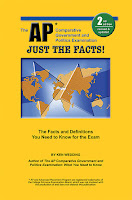Pair or proxy?
Legislatures in liberal democracies found a way to preserve voting rights of legislators a hundred years ago. It's probably time for something new.
An obscure British parliamentary rule was broken. Here’s why it’s a big deal.
Teaching Comparative blog entries are indexed. Use the search box to look for country names or concept labels attached to each entry.
 Just The Facts! 2nd edition is a concise guide to concepts, terminology, and examples that will appear on May's exam.
Just The Facts! 2nd edition is a concise guide to concepts, terminology, and examples that will appear on May's exam.
Just The Facts! is available. Order HERE.
Amazon's customers gave this book a 5-star rating.
An obscure British parliamentary rule was broken. Here’s why it’s a big deal.
Last week in the U.K.’s House of Commons, the governing party appeared to cast aside its “pairing rule,” a chamber practice that has been used to preserve voting rights of absent Members of Parliament (MPs) — including MPs out on maternity leave.
This caused a huge outcry, with the minister for the Cabinet Office forced to respond to an urgent question in the House of Commons this week, promising that such errors would not be repeated. But the ensuing controversy also highlights the limitations of relying on informal legislative practices in increasingly diverse parliamentary bodies.
This is how legislative pairing works
Pairing is an informal arrangement between two legislative parties when an MP is sick, on parental leave, or otherwise not present to vote. If a legislator knows he or she will be absent, the party whips can “pair” the absent MP with an opposing party MP. Here’s the key: The opposing party MP promises not to vote. By refraining from voting, the votes of the paired legislators cancel the other one out.
With pairing, unavoidable absences do not penalize the missing MP’s party. Moreover, according to Lord Michael Heseltine, who has held positions in U.K. politics since 1966, legislative pairing prevents the “spectacle” of ambulances arriving at Parliament to bring ill politicians to vote.
This is informal practice, and the House of Commons does not officially recognize paired voting. Instead, MPs or party whips make these arrangements at the party level, as needed. For pairs to function as intended, both whips and politicians must honestly adhere to agreed arrangements. The legislatures of Canada, Australia and the United States all use versions of paired voting procedures.
The system broke down in the House of Commons
The pairing practice applies to all MPs… But it disproportionately affects female MPs such as Jo Swinson, a Liberal Democrat on maternity leave after the birth of her second child. Here’s what happened last week: A Conservative MP, Brandon Lewis, cast two votes that violated a pairing agreement that had been set up to accommodate Swinson’s maternity leave.
Conservatives at first defended the votes Lewis cast as an “honest mistake” and a “genuine mix-up.” Other Conservative MPs later conceded that their party whip asked MPs to break their pairing arrangements on two Brexit amendment votes because of anticipated close margins. As it turns out, Lewis’s votes did not ultimately change the outcomes…
Among 43 potential changes, the 2016 Good Parliament Report… proposed proxy voting for absent MPs as an alternative to pairing. Proxy voting allows MPs to delegate their vote when they are absent to an MP who is present.
Unlike pair voting, proxy voting lets an MP continue to represent his or her constituents without worrying that an arrangement will be broken for a particularly important vote…
Teaching Comparative blog entries are indexed. Use the search box to look for country names or concept labels attached to each entry.
 Just The Facts! 2nd edition is a concise guide to concepts, terminology, and examples that will appear on May's exam.
Just The Facts! 2nd edition is a concise guide to concepts, terminology, and examples that will appear on May's exam.Just The Facts! is available. Order HERE.
Amazon's customers gave this book a 5-star rating.



Comments
Post a Comment